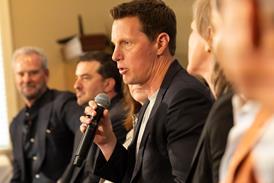German cinema features prominently in the official competition section of next month's Berlinale, the first under new director Dieter Kosslick's leadership.
Echoing the wide range of films now coming out of Germany, four of the main competition titles are German:Tom Tykwer's opening film Heaven, starring Cate Blanchett and Giovanni Ribisi; digitally shot films Grill Point (Halbe Treppe) by Andreas Dresen and A Map Of The Heart by Dominik Graf; and Baader from new director Christopher Roth. In addition, there will be an out of competition screening of Wim Wenders' rockumentary Viel Passiert - Der BAP Film and a 70th birthday gala screening of Alexander Kluge's 1979 film Die Patriotin.
The heavy German slant of the competition is also visible in other competition films. Private German money was invested in Costa-Gavras' Amen, Bertrand Tavernier's Safe Conduct (Laissez Passer), and Istvan Szabo's Taking Sides - all films tackling very German subjects (the Catholic Church's alleged complicity in the Nazi's final solution, filmmaking during the German occupation of France, and the process of de-Nazification after the Second World War). German equity from VCL also backed Robert Altman's Gosford Park.
By comparison, last year's festival under predecessor Moritz de Hadeln had only two German films in competition - Enemy At The Gates and My Sweet Home - and they were both directed by non-Germans. Three others - Traffic, Quills and Little Senegal - were made with German financial backing.
Commenting on the more pronounced presence of German films at this year's Berlinale, Kosslick told a German magazine: "I wouldn't say that we are now having "Deutschland, Deutschland uber alles". The fact that people will talk a lot about German cinema is not only connected with the competition but also with the new sidebar of Perspective German Cinema.
"But so far as I can steer it, I will try to bring the Berlinale together with the German film scene and the German film industry", he noted, pointing out that in the same way that Cannes serves the French film industry, so the Berlinale should be used as "a marketing instrument for the national cinema".
Moreover, the Berlinale's function as a discussion forum is to receive a major boost this year with a programme of industry panels organised by the festival itself as well as by trade associations and other institutions. German producers lobby group Film 20 will kick off proceedings on February 6 with a conference on film financing with such speakers as Liberty Media's Miranda Curtis, producers Bernd Eichinger, Uli Felsberg, Deutsche Bank's Irmgard Maria Schaeuble and Filmstiftung NRW's Michael Schmid-Ospach.
BERLIN: 2002 Competition Films
Heaven by Tom Tykwer (opening film)
Amen by Constantin Costa-Gavras
A Map Of The Heart (Der Felsen) by Dominik Graf
Grill Point (Halbe Treppe by Andreas Dresen
Eight Women (Huit Femmes)by Francois Ozon
Monday Morning (Lundi Matin) by Otar Iosseliani
Minor Mishaps (Sma Ulykker), by Annette K. Olesen
Safe Conduct (Laissez-Passer) by Bertrand Tavernier
Iris by Richard Eyre
Monster's Ball by Marc Forster
Bad Guy (Na-Bbun-Nam-Ja) by Kim Ki-duk
The Royal Tenenbaums by Wes Anderson
Spirited Away by Hayao Miyazaki
Baader by Christophe Roth
Burning In The Wind (Brucio Nel Vento) by Silvio Soldini
The Shipping News by Lasse Hallstrom
Stones (Piedras) by Ramon Salazar Hoogers
One Day In August (Dekanpentavgoustos) Constantinos Giannaris
Bloody Sunday by Paul Greengrass
Beneath Clouds by Ivan Sen
Bridget by Amos Kollek
Temptations (Kisertesek) by Zoltan KamondiKT by Junji Sakamoto


















No comments yet